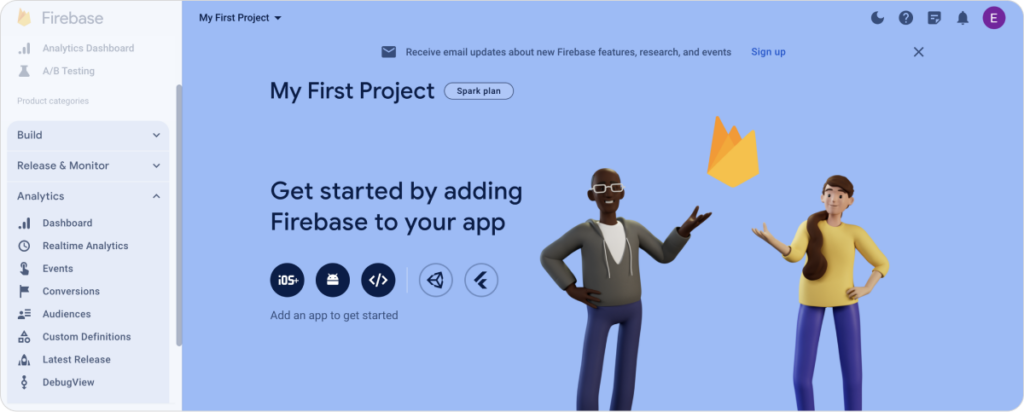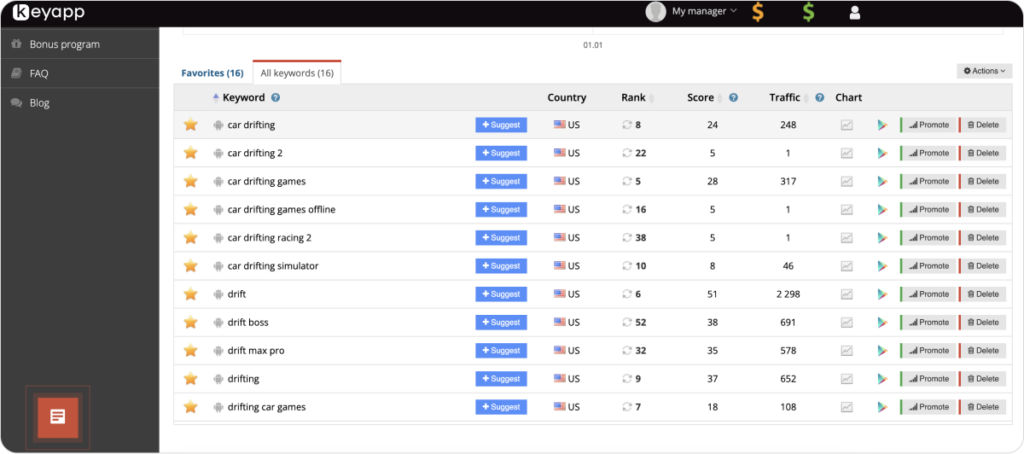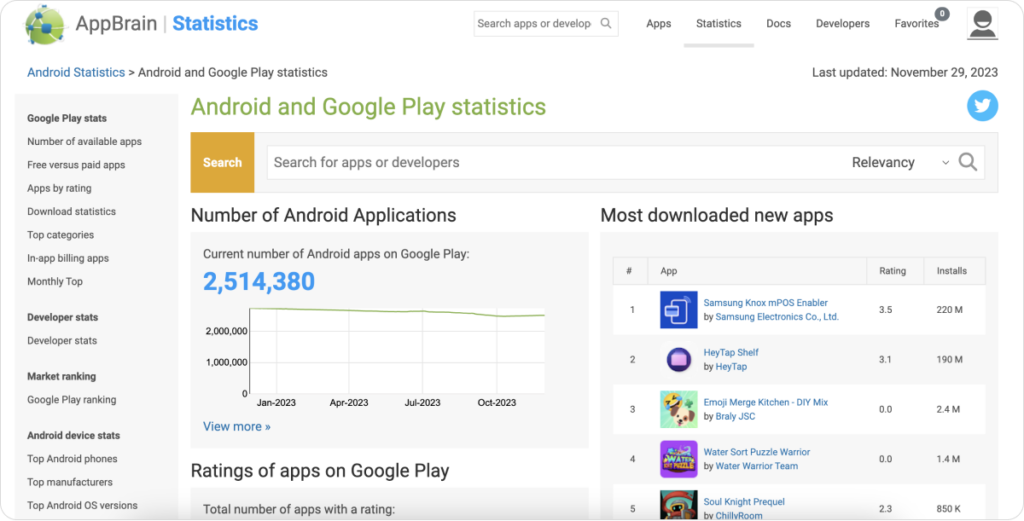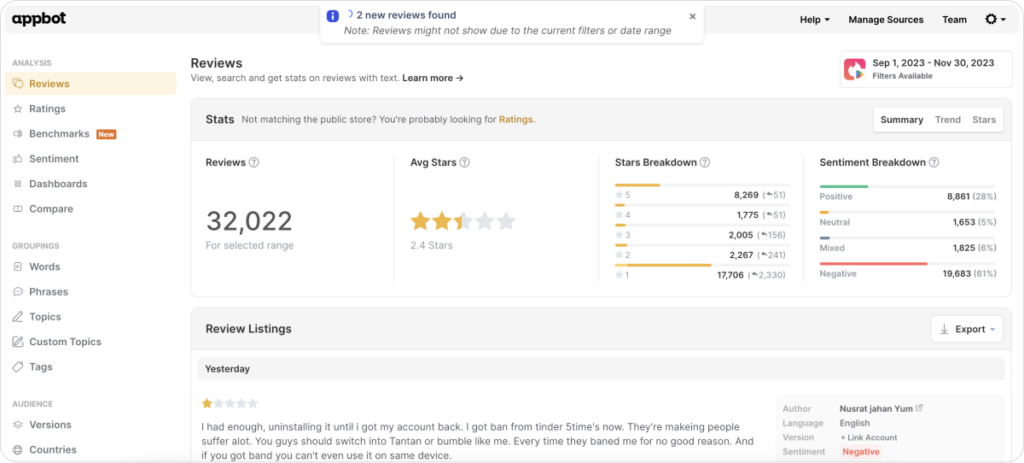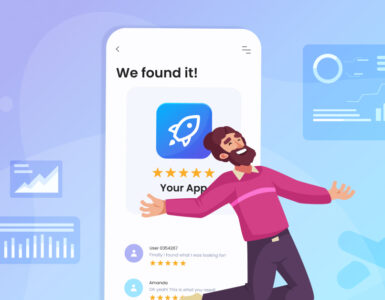The current world of mobile applications is developing extremely fast and almost every day new and new trends emerge which forces app developers and marketers to come up with new ideas for user acquisition. While we talk a lot about app marketing, ASO, and keyword promotion, it is necessary as well to pay some attention to the tools that make our lives easier and help to analyze the application performance, the success of strategies applied for app promotion as well as the way the app attracts users and make them keep high retention rate for the project. This article will focus on some analytics and tracking tools as luckily, while the app market increases, the number of tools available increases the same way.
The benefits of app analytics and tracking tools
Nowadays working with mobile applications no one can imagine the work process without applying additional tools for analysis. These tools help in many fields, starting from the basics of ASO to the analysis of user acquisition processes and user behavior while they are already attracted to the app from different sources. Let’s consider the most obvious benefits of the tools both for UA and ASO analysis.
User Acquisition Analysis:
- Optimizing Marketing Investments:
App analytics tools provide precise tracking of user acquisition channels and their performance, enabling businesses to allocate their marketing budget effectively. This insight helps focus on channels that attract high-value users while optimizing or discontinuing underperforming ones.
- Assessing Campaign Performance:
For businesses managing various marketing campaigns, these tools offer in-depth analysis of each campaign’s performance. Metrics like click-through rates, conversion rates, and user engagement provide a comprehensive understanding of campaign effectiveness, guiding marketers in refining their strategies.
- Segmenting Users:
App analytics tools allow the segmentation of users based on criteria such as demographics, behavior, and location. This segmentation is pivotal for tailoring marketing campaigns to specific audience segments, ensuring a more personalized and targeted approach.
App Store Optimization (ASO) Analysis:
- Enhancing Keyword Visibility:
ASO heavily relies on keyword optimization to improve an app’s visibility in app store search results. Analytics tools assist in identifying the most relevant and high-performing keywords for an app, enabling developers to optimize their app store listing for maximum discoverability.
- Optimizing Conversion Rates:
App analytics tools provide insights into user behavior on an app’s store page. Through the analysis of conversion rates, developers can optimize app store assets such as icons, screenshots, and descriptions to increase the likelihood of users downloading the app after visiting its store page.
- Monitoring User Reviews and Feedback:
Monitoring user reviews and feedback is an integral aspect of ASO. Analytics tools aggregate and analyze user reviews, helping developers identify common issues, positive sentiments, and areas for improvement. This feedback loop is crucial for making iterative enhancements to the app.
In conclusion, the advantages of app analytics and tracking tools extend beyond mere performance monitoring. They play a pivotal role in shaping successful user acquisition strategies and optimizing app store presence. By utilizing these tools for both UA and ASO analysis, developers and businesses can develop a holistic approach to app growth, ensuring sustained success in the competitive app ecosystem.
Top 5 tools for app performance and user behavior analysis
1. Firebase Analytics
Firebase is a part of the Google Firebase Suire and for now, it is one of the most powerful and user-friendly tools that is created exactly for the work with mobile and web applications. Firebase focuses on the real-time analysis of events and may provide detailed data about the app performance and user behavior to help developers work with the quality of the application in general and adjust their strategy according to the needs of the existing and new users.
Let’s get a closer look at the most important features of this tool:
- Real-time Analytics:
Firebase gives the possibility to work with the data in real-time which allows app developers and marketers to monitor user behavior and events inside the app at once as they happen. This Firebase feature is extremely valuable as this gives benefits in quick reaction to any changes and issues and allows to proceed only with data-driven decisions.
- User Segmentation:
Firebase allows to segment users. App developers and marketers can choose different criteria for this including country, behavior, and custom user properties. This feature empowers to target specific groups of users with a particular type of content or experience.
- The wide variety of products:
As you may know, there are other tools of Firebase besides analytics, including Firebase Crashlytics for crash reports, Firebase Cloud Messaging for push notifications, and Firebase Authentification for user authentication. All these tools together allow to create a kind of ecosystem that gives the possibility to work with different aspects and analyze the app performance from different perspectives.
- Conversion Tracking:
Firebase Analytics assists in tracking conversions by analyzing user journeys from acquisition to conversion. This feature is crucial for understanding the effectiveness of marketing campaigns and optimizing the user onboarding process to enhance conversion rates.
To sum up, Firebase Analytics is a useful tool that provides analytics as well as the possibility of integration of additional Firebase services. Offering real-time insights, user segmentation, and functionalities such as in-app messaging, it not only facilitates a deep understanding of user behavior but also enables developers to actively connect with their audience, providing a more personalized and impactful app experience.
2. AppsFlyer
AppsFlyer is one of the leading platforms in the mobile attribution and marketing field. The main aim of this service is to provide comprehensive details about the mobile application performance.
Let’s check the main features and advantages of this tool.
- Attribution Insights:
AppsFlyer is perfect for the analysis of user attribution and actions to specific marketing channels, which gives app developers the possibility to measure the effectiveness of their marketing efforts and UA. This feature is essential for optimizing advertising spend and maximizing the ROI.
- Real-Time Tracking:
In the same way as Firebase does, AppsFlyer allows tracking user behavior in real-time which makes it possible to proceed with fast and data-driven decisions in the way developers work with user attraction. As we may see from this and the previous tools, the possibility to track the data as it is is essential for any tracking tool as only going this way will give an understanding of how successful the strategy is and if some changes should be applied. At the same time, such an approach provides the possibility to react fast and effectively.
- Fraud Detection:
A robust fraud detection system is integrated into AppsFlyer, helping businesses identify and minimize fraudulent activities that can impact the accuracy of attribution data. This ensures that marketing efforts are based on reliable and original insights.
- Deep Linking:
AppsFlyer allows to work with deep links, giving developers the possibility to create original and personalized user experiences by directing users to specific content or features within the app. Deep linking enhances user engagement and improves overall user satisfaction. At the same time, using this feature developers can get more precise data on user behavior in the app. For example, you could even notice that on our platform you can create deep links for iOS campaigns as well so as to be able to differentiate our traffic from other sources.
In simple terms, AppsFlyer is an essential part of businesses with apps. It helps developers and marketers understand how well their app is doing and how effective their marketing campaigns are. With its many useful features, like figuring out where new users come from and tracking what users do in real-time, AppsFlyer makes it easier for businesses to make smart choices and succeed in the world of mobile apps.
3. Keyapp
Two previous tools are focused on the analysis of user attribution and behavior, but still, there is no way that we forget about App Store Optimization and the ways we can attract organic traffic on Google Play and AppStore. Actually, that’s what ASO does – it helps to make your application more popular among organic users while helping to achieve higher ranks and conversion rates. Working with ASO, any app developer or marketer needs the tool to work with keywords to make sure that the requests added to text metadata are relevant, popular, and have traffic. And despite the fact that Keyapp’s main service is keyword promotion, we do our best to provide ASO tools as well to make the process of keyword research and ASO faster and easier.
Let’s dive deeper into the main tools Keyapp offers:
- Keyword popularity analysis:
Keyword popularity provides an understanding of how often the keyword is used in the store and how competitive it is. These details help to evaluate the importance of adding the requests to the title, short/full descriptions, and keyword field as well as help to define the strategy for keyword promotion (how long the keyword should be promoted for, how many installs to use, etc).
- Keyword ranks monitoring:
The most important factor influencing the way an app gets organic traffic from the search is the positions the app has for keywords. That’s the reason why we talk a lot about keyword position monitoring and keyword promotion. The Keyapp platform allows any app developer and marketer to work with keywords and ranks completely for free without any limitations. This feature gives the possibility to track the app positions for any search request in 150+ countries for a period of up to 1 year. Tracking these details will help to define the success of the ASO strategy, UA from the search, and any changes in the number of traffic the app has.
- Suggested keywords:
As it is known, keyword research is the main step in app texts optimization. The keywords should be gathered carefully and it is necessary to add all the possible requests to the research to be sure that you won’t miss the chance to attract organic traffic. At the same time, this process is not possible without gathering suggested keywords which users may see when they type any request in the search bar on the store. Keyapp gives the possibility to get this data for any region and request without the necessity to check this manually on Google Play or AppStore.
In general, even though keyword promotion is the main service, Keyapp offers powerful tools for keyword research which cannot be replaced by any other method when developers work with ASO. These features are essential when it comes to optimization and organic traffic from the search.
4. AppBrain
Primarily AppBrain is a platform that helps users find apps and read the reviews about them on one side and offers promotional tools for developers on the other side. So if to talk in general that’s the platform connecting the possibilities for both parts of the app world – the users and developers. But as we mainly focus on user attraction, in this article we will talk about the advantages AppBrain offers for app developers and marketers.
Among the main features of AppBrain are
- App promotion and monetization:
AppBrain can help app developers to promote their applications and attract more users so to increase revenue and show the application to a broader audience. This is achieved with the help of different advertising options, including sponsored app placements and banners. At the same time, AppBrain’s ad network allows developers to monetize their apps using advertisement services, mostly in-app ads.
- Analytics:
This platform provides the possibility to use analytics services as well to track the app performance and success of marketing strategies used. The tools available include the analysis of the downloads number, user engagement, and conversion rates.
- AppBrain SDK:
It is a set of tools and resources provided by the platform and is aimed to help Android app developers integrate the SDK into their applications to access additional features. For example, using this tool will help to personalize the app recommendations based on user behavior and preferences, as well as analyze and track user interactions.
To sum up, AppBrain is a mobile app discovery platform and ad network for Android. It helps users find new apps and assists developers in promoting their apps to a broader audience. Features include app recommendations, user reviews, and tools for effective app promotion.
5. Appbot
As we always repeat, app reputation is one of the most important factors influencing the success of mobile application, as it influences conversion rates, user engagement, success of app marketing, keyword promotion, ASO, indexation and many more things. So it is obvious that app developers and marketers are looking for the convenient tool to work with app reputation even despite the fact that it is possible to check rates and reply reviews in developer accounts, although this may be not convenient if the app has active users leaving a lot of feedback every day. One of such tools helping with app reputation is Appbot.
Main features of this platform include the following:
- Review Aggregation:
This tools helps to get the reviews for any application for different mobile stores, including Google Play, AppStore, Amazon. In such a way developers can centralize and analyze the feedback about the app from different stores simultaneously.
- Sentiment Analysis:
Appbot can proceed with sentiment analysis to categorize the reviews as positive, neutral and negative. This feature helps app developers and marketers to get quickly how users evaluate the application and proceed with data-driven decisions about the possible changes.
- Automatic replies:
Appbot can help to reply the reviews automatically using AI replies or your own canned replies. The tools allows to configure rules by star rating, topic, sentiment, language etc and analyzing this details will reply the reviews automatically without any manual work.
In summary, Appbot is useful for app developers because it streamlines the process of gathering and analyzing user feedback, offering insights that are crucial for enhancing app performance, addressing user concerns, and making informed decisions about future updates and features.
SUM UP
As we may see, the market of mobile apps is developing rapidly adding more and more challenges for app developers and marketers in app promotion and data analysis. Despite this fact, the evolution of mobile markets brought the development of tools helping to analyze the data, gather the feedback from users, evaluate the success of marketing campaigns and proceed with ASO in a correct way increasing the app chances to attract high-quality, interested users and get higher ROI. The current level of competitiveness on Google Play and AppStore cannot be omitted and it is necessary for sure try to apply different strategies in app marketing and data analytics to be sure that you go the right way and your app will get top ranks in the search list attracting more and more organic traffic.


